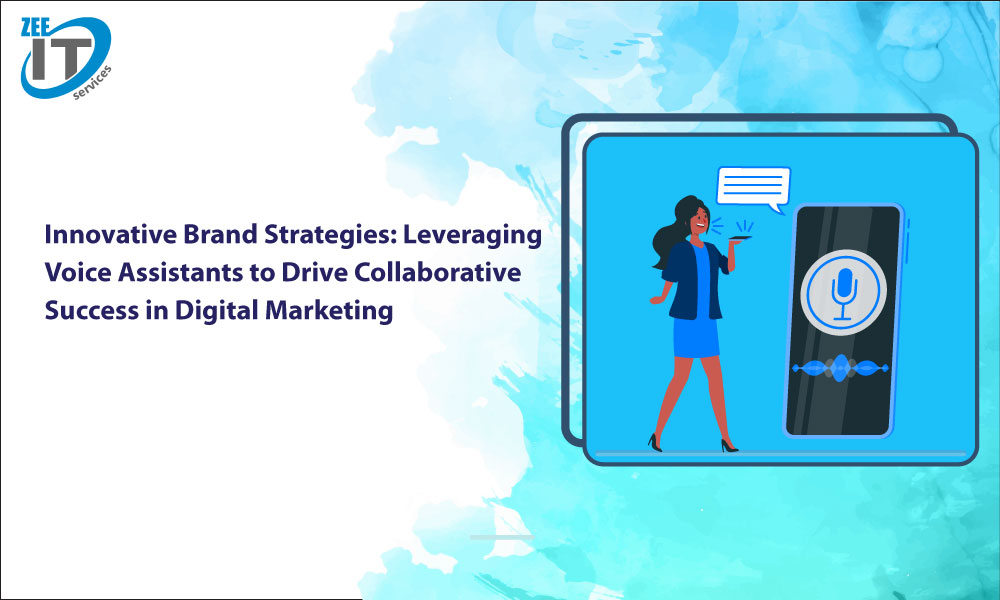Different brands now consistently seeking innovative strategies to engage with their target audience effectively. One such strategy that has gained significant traction in recent years is leveraging voice assistants to enhance digital marketing efforts. Voice assistance is a widely used technology in the USA. According to research, there will be 145.1 million users of voice assistance in the US by the end of 2023. You can access different voice assistance like Google Assistance, Alexa, Siri, Microsoft’s Cortana, and others on your smartphones, TVs, desktops, laptops, tablets, and other types of devices. But how can people leverage this technology in their digital marketing efforts? To provide a detailed solution to this topic, we have prepared this guide, which digs into the notion of voice marketing and investigates how businesses may use this rising trend to create collaborative success in their digital marketing activities.
Understanding Voice Marketing
Voice-enabled devices, including virtual assistants and smart speakers, are used in voice marketing, which is the practice of interacting with customers using voice commands. Voice search and voice-activated technologies have grown more commonplace in customers’ daily lives with the growing popularity of gadgets like Apple’s Siri, Google Home, and Amazon Echo. There’s a rare chance for companies to engage their customers more conversationally and engagingly with this trend towards voice contact.
Functionalities of Voice Assistants
- Voice assistants employ advanced voice recognition technology to accurately interpret and understand spoken commands from users.
- NLP enables voice assistants to understand the context of user queries, allowing for more natural and conversational interactions. Voice assistants can understand nuances in language, process complex requests, and provide relevant responses based on user input.
- Moreover, Voice assistants automate various tasks and processes, such as setting reminders, scheduling appointments, sending messages, and controlling smart home devices.
- Voice assistants access vast databases of information to provide users with answers to questions, recommendations, and updates on various topics like weather forecasts, news headlines, or trivia facts.
- Furthermore, Voice assistants seamlessly integrate with smart home devices and IoT (Internet of Things) devices, allowing users to control lights, thermostats, security cameras, and other appliances using voice commands.
- By learning from user interactions and behavior, voice assistants can provide customized recommendations, reminders, and suggestions to enhance the user experience.
- Voice assistants enable users to make purchases and transactions using voice commands. Whether it’s ordering products online, reordering groceries, or booking services, voice shopping simplifies the purchasing process for users.
- Voice assistants provide access to a wide range of entertainment content, including music, podcasts, audiobooks, and radio stations. Users can use voice commands to play, pause, skip, and control media playback hands-free.
- Some voice assistants offer language translation capabilities, allowing users to translate phrases and sentences between different languages. Additionally, this feature is particularly useful for travelers or individuals communicating with people who speak different languages.
- Voice assistants incorporate accessibility features to cater to users with disabilities or special needs. Moreover, these features may include voice commands for navigating menus, reading text aloud, and providing audio descriptions of visual content.
Benefits of Leveraging Voice Assistants in Digital Marketing:
Integrating voice assistants into digital marketing strategies offers several compelling benefits for brands:
Enhanced Customer Experience
Voice-enabled devices provide consumers with a simple and straightforward method to communicate with companies, improving their whole purchasing experience. Voice assistants’ simplicity and customization boost user engagement, allowing marketers to gain important consumer information. Additionally, using this information, organizations can continuously enhance their services and adjust products to successfully suit the demands of their customers.
Increased Brand Visibility
Optimizing content for voice search improves a brand’s visibility in voice search results, increasing organic traffic and giving it a competitive advantage in the industry. Moreover, speech assistants play an important role in increasing click-through rates (CTR) for websites because users are more likely to interact with speech-optimized content that shows in voice search results.
Improved Accessibility
Voice technology improves access to digital content for people with disabilities, encouraging inclusion and accessibility. In addition, by introducing voice assistants into digital marketing campaigns, companies can ensure that their information is available to all consumers, regardless of their ability or difficulty navigating traditional digital interfaces.
Improved Banking Operations:
In addition to its applications in digital marketing, AI-powered voice assistants are transforming the banking and financial services industry. Companies are integrating AI-powered voice assistants into their call centers, alongside text-based chatbots, to enhance customer support services. Banks like Bank of America and U.S. Banks have experienced rapid adoption rates of these tools, leveraging voice-activated commands to perform various tasks and provide seamless assistance to customers.
Key strategies for leveraging Voice assistants in Digital Marketing
Here are several key strategies for leveraging voice assistants in digital marketing:
Voice Commerce:
Speech commerce, often known as v-commerce, is the process of making purchases with speech instructions on voice-enabled devices. Moreover, businesses can tailor their e-commerce systems to support speech search and voice-activated shopping, allowing customers to shop simply and seamlessly with voice assistants.
Voice-Activated Advertising and Sponsored Results
Businesses can utilize voice-activated advertising to market their products and services on voice-enabled devices. Businesses may successfully boost conversions by establishing tailored ad campaigns that are designed for voice search inquiries. Sponsored results on voice assistants allow companies to appear prominently in search results, capturing the attention of potential consumers.
Voice Assistants and Local Business
Voice assistants play an important part in local business discovery by allowing customers to use voice commands to find nearby companies, restaurants, and services. Businesses should improve their web listings and directories for voice search to increase exposure and attract local consumers who are actively looking for items or services in the region.
Voice Analytics
Voice analytics enables organizations to gain important data from customer voice interactions. Additionally, by evaluating voice search queries, user preferences, and conversational data, organizations may acquire a better knowledge of customer behavior, preferences, and purpose, allowing them to adjust their marketing tactics.
Voice-Assisted Content Marketing and Storytelling
Businesses can utilize voice assistants to provide interesting and interactive content experiences to customers. Businesses can use voice-assisted content marketing to engage consumers and develop deeper relationships with their brands by telling brand stories and delivering audio content, as well as giving interactive experiences and voice-guided tours.
Challenges faced by the voice assistant
Furthermore, despite the numerous benefits and opportunities offered by voice assistants, the industry also faces several challenges that need to be addressed:
Privacy Concerns
Privacy is a significant concern for users of voice assistants, as these devices often collect and store sensitive personal data, including voice recordings and user interactions. To overcome these privacy issues, data protection measures and transparent privacy policies are essential to maintain user trust and confidence.
Security Vulnerabilities
Voice assistants are susceptible to security vulnerabilities, such as hacking, data breaches, and unauthorized access. Strengthening security protocols and implementing encryption measures are critical to protect user data and protecting against potential cyber threats.
Accuracy and Reliability
Achieving high accuracy and reliability in voice recognition and natural language processing remains a challenge for voice assistants, especially in noisy environments or with accents and dialects. Moreover, continued advancements in speech recognition technology are necessary to improve accuracy and enhance user experience.
Integration Complexity
Integrating voice assistants with existing systems and platforms can be complex and challenging for businesses, particularly in industries with strict regulatory requirements or legacy infrastructure. Streamlining integration processes and ensuring compatibility with various devices and applications are essential for seamless adoption and implementation.
Limited Understanding and Context
Voice assistants may struggle to understand complex queries or provide relevant responses without proper context. Enhancing natural language understanding and contextual awareness capabilities is crucial to improving the effectiveness and usability of voice assistants in various scenarios.
Frequently Asked Questions
What are voice assistants, and how do they work?
Voice assistants are AI-powered digital technologies that respond to voice commands to perform tasks or provide information. They work by processing natural language input and executing commands based on predefined algorithms.
How can brands leverage voice assistants in digital marketing?
Brands can leverage voice assistants by optimizing content for voice search, integrating voice-enabled features into their marketing strategies, and collaborating with influential voices in the voice-first space.
What benefits do voice assistants offer in digital marketing?
Voice assistants enhance customer experiences, increase brand visibility in voice search results, improve accessibility for users, and provide valuable insights for brands to enhance their services.
How can voice assistants drive collaborative success in digital marketing?
Voice assistants facilitate collaboration by providing seamless communication channels between brands and consumers, enabling personalized interactions and fostering deeper engagement.
How can brands ensure the success of their voice assistant initiatives?
Brands can ensure success by conducting thorough market research, understanding their target audience’s preferences, providing valuable and relevant content, and continually optimizing their voice assistant strategies based on user feedback and insights.


